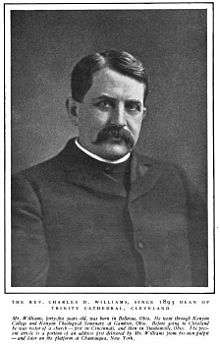Charles D. Williams
Link to Wikipedia article: Charles D. Williams
| Right Reverend Charles David Williams | |
|---|---|
| IV Bishop of Michigan | |
 Charles David Williams as Dean of Trinity Cathedral in Cleveland | |
| Church | Episcopal Church |
| Diocese | Michigan |
| Predecessor | Thomas Frederick Davies, Sr. |
| Successor | Herman Page |
| Orders | |
| Ordination | Deacon in 1883, priest in 1884 |
| Consecration | 1906 |
| Personal details | |
| Born |
July 30, 1860 Bellevue, Ohio |
| Died | February 14, 1923 (aged 62) |
| Alma mater | Kenyon College and Bexley Hall |
Charles David Williams (July 30, 1860 - February 14, 1923) was the fourth bishop of the Diocese of Michigan in the Episcopal Church in the United States of America. He was an advocate of the "Social Gospel" views of Walter Rauschenbusch.
Personal
Charles David Williams was born July 30, 1860 in Bellevue, Ohio. He was educated at Kenyon College and Bexley Hall where he was ordained an Episcopal deacon in 1883 and priest in 1884. He died February 14, 1923.[1]
Professional
Williams served as priest of Fernbank, Ohio and Riverside, Ohio from 1884 to 1889; as deacon at St. Paul's in Steubenville, Ohio from 1889 to 1893; and as dean of Trinity Cathedral in Cleveland from 1893 to 1906. In 1906, he was consecrated as bishop of the Michigan Diocese of the Episcopal Church, where he remained until his death in 1923.[1]
In his religious and social views, Williams was a liberal clergyman who advocated for the views of Walter Rauschenbush. Williams believed that the church should play an active role in resolving social problems. Although convinced that the church would always need to minister to individual philanthropic causes, he argued equally vigorously that the established denominations, in their teachings and advocacy of basic principles, should support reform of the economic and industrial system.[1]
He was a member of the commission of church leaders that investigated the steel industry and was national president of the Church League for Industrial Democracy. After the January 1920 raids in Detroit, Bishop was recruited as part of a citizens committee to help release the over 1000 men illegally arrested for peaceful assembly by the Justice Department run by General Palmer. This citizen's committee was led by Federick F Ingram and the other members were SS Kresge, FE Brown, FE Steelwagen, & Fred M Butzel.[2] In 1921, he attended a seminar in England that studied the English labor movement in its relation with the church.[1]
References
External links
- Works by or about Charles D. Williams at Internet Archive
- Charles David Williams papers at Bentley Historical Library
- Bibliographic directory from Project Canterbury
| Episcopal Church (USA) titles | ||
|---|---|---|
| Preceded by Thomas Frederick Davies, Sr. |
4th Bishop of Michigan 1906 - 1915 |
Succeeded by Herman R. Page, Sr. |
